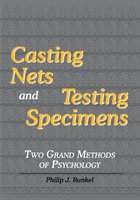| Home about PCT Presentation Order | |
|
Michael CramerLike a detective in the heat of investigating a crime, a psychological researcher hunts feverishly among the data for principles not evident to the casual observer. Even in the excitement of the hunt, however, a cooling pause, perhaps a refreshing touch of rain, can permit a reassessment of goals and methods. Such a refreshing rain shower is Casting Nets and Testing Specimens by Philip J. Runkel. In his book, Runkel reviews current psychological research methods (i.e., ‘casting nets’) and tells the reader in an easily understandable way what kinds of information the methods do and do not provide. Any research method is a tool appropriate in some but not all situations. The mainstream research tools of psychology are not sufficient to explain individual behavior and its causes. Following this review, the reader is familiarized with the concept of causation and with W. T. Powers’s Perceptual Control Theory, the framework necessary for a change in perspective on human behavior (i.e., ‘testing specimens’). The author explains how an appropriate investigation of causation in individual human behavior should be designed and then expands the view to an interaction between individuals. The clear didactic concept, the many instructive examples, and the entertaining writing style make the pages virtually fly by. I recommend this book to all advanced students of psychology who already have acquired a good knowledge of statistics and research methodology. They will appreciate the critique of mainstream research paradigms in contemporary psychology and will be astonished that there is a new and fascinating way to think about human behavior. Dipl.-Psych. Michael Cramer, Kaufbeuren, Germany
|
|
| © 2004–2024 Living Control Systems Publishing |
|

